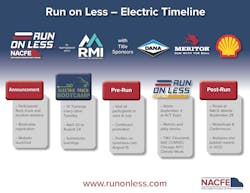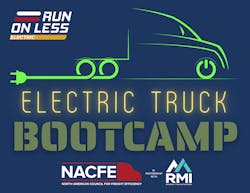NACFE announces Run on Less – Electric’s participating fleets
This fall, 13 fleets will take part in the North American Council for Freight Efficiency’s (NACFE) Run on Less – Electric, a real-world demonstration of zero-emissions goods movement.
“These bold fleets who have committed to Run on Less – Electric represent the diverse range of applications in which electric vehicles make sense, said Mike Roeth, executive director, North American Council for Freight Efficiency.
The following fleets are helping NACFE and its partner RMI showcase the benefits and discuss the challenges of electric trucks.
- Alpha Baking Co. operating a Workhorse C1000 in Chicago, Illinois
- Anheuser-Busch using a BYD tractor in the Los Angeles area
- Biagi Brothers operating a Peterbilt 579EV out of Sonoma, California
- Cardenas Inc. using an Xos van in Ventura, California
- NFI using a Volvo VNR Electric out of Chino, California
- Penske operating a Freightliner eCascadia in Los Angeles
- PepsiCo’s Frito Lay Division using a Cummins box truck in Modesto, California
- Purolator operating a Motiv-powered step van in Vancouver, British Columbia, Canada
- Roush Fenway Racing using a ROUSH CleanTech truck out of Concord, North Carolina
- Ruan using an Orange EV terminal tractor in Otsego, Minnesota
- Ryder System, Inc. using a Lonestar Specialty Vehicles terminal tractor in Georgetown, Kentucky
- SAQ: Quebec Liquor board operating a LION8 truck in Montreal, Quebec, Canada
- TBD operating a Lightning eMotors truck in the New York City area
- There are three vans, three medium duty box trucks, a heavy duty truck and four heavy duty tractors in drayage and regional haul, and two terminal tractors.
- Six operate in California, two in Canada, and five throughout the rest of the United States.
- They are delivering home goods, beer, wine and liquor, baked goods, snacks, groceries, auto parts, mail, and packages and general freight.
“We are very excited about the mix that these early adopting fleets represent and how that reflects the current state of electric truck actions across North America,” said Roeth. “The interest in electric vehicles is spreading across North America as more companies recognize the value of zero-emission solutions.”
The three-week event will start on September 3 at ACT Expo and will feature metrics and daily real-world stories on runonless.com. The Run’s finale will take place at the North American Commercial Vehicle show in Atlanta September 27-30.
Title sponsors include Dana, Meritor, and Shell, with others sponsoring individual elements of the Run as well. Recognizing that the move to electric vehicles takes more than just changes in engines and equipment, one element of Shell’s support of the program will be to provide Renewable Energy Certificates (RECs) equal to the total energy usage of all of the participating battery electric vehicles.
“We are still seeking additional support, and anyone interested in supporting us in our efforts should contact me at 260-750-0106,” Roeth said. For a full list of all of the sponsors for RoL-E, click here.
“There is a thirst for knowledge on electric trucks and we are convening stakeholders across the entire electric truck ecosystem to discuss key opportunities and challenges in the deployment of commercial battery electric vehicles,” said Jessie Lund, senior associate, RMI and host of the Bootcamp education series.Accompanying the event will be 10 training sessions dubbed the Electric Truck Bootcamp, powered by ACT News. The first one is scheduled for Tuesday, April 20, followed by a new training every other Tuesday through August 24. Topics the Bootcamp will cover include:
- Why Electric Trucks?
- Charging 101 — Planning & Buildout
- Charging 201 — Power Management & Resilience
- Working with Your Utility
- Incentives for Electrification
- Maintenance, Training & Safety
- Finance & Innovative Business Models
- Battery Supply Chains & End of Life
- Global Perspectives
- Drivers & Electric Trucks
You can register for the Electric Truck Bootcamp here.
This is NACFE’s third event in the Run on Less series. The first, Run on Less 2017, focused on long haul routes and the seven drivers averaged 10 MPG. During the second event, Run on Less Regional, 10 drivers average 8.3 MPG hauling in a wide variety of regional haul applications.
Some of these vehicle-manufacturer pairings are part of California Climate Investments, a statewide initiative that puts billions of Cap-and-Trade dollars to work reducing greenhouse gas emissions, strengthening the economy, and improving public health and the environment – particularly in disadvantaged communities.


